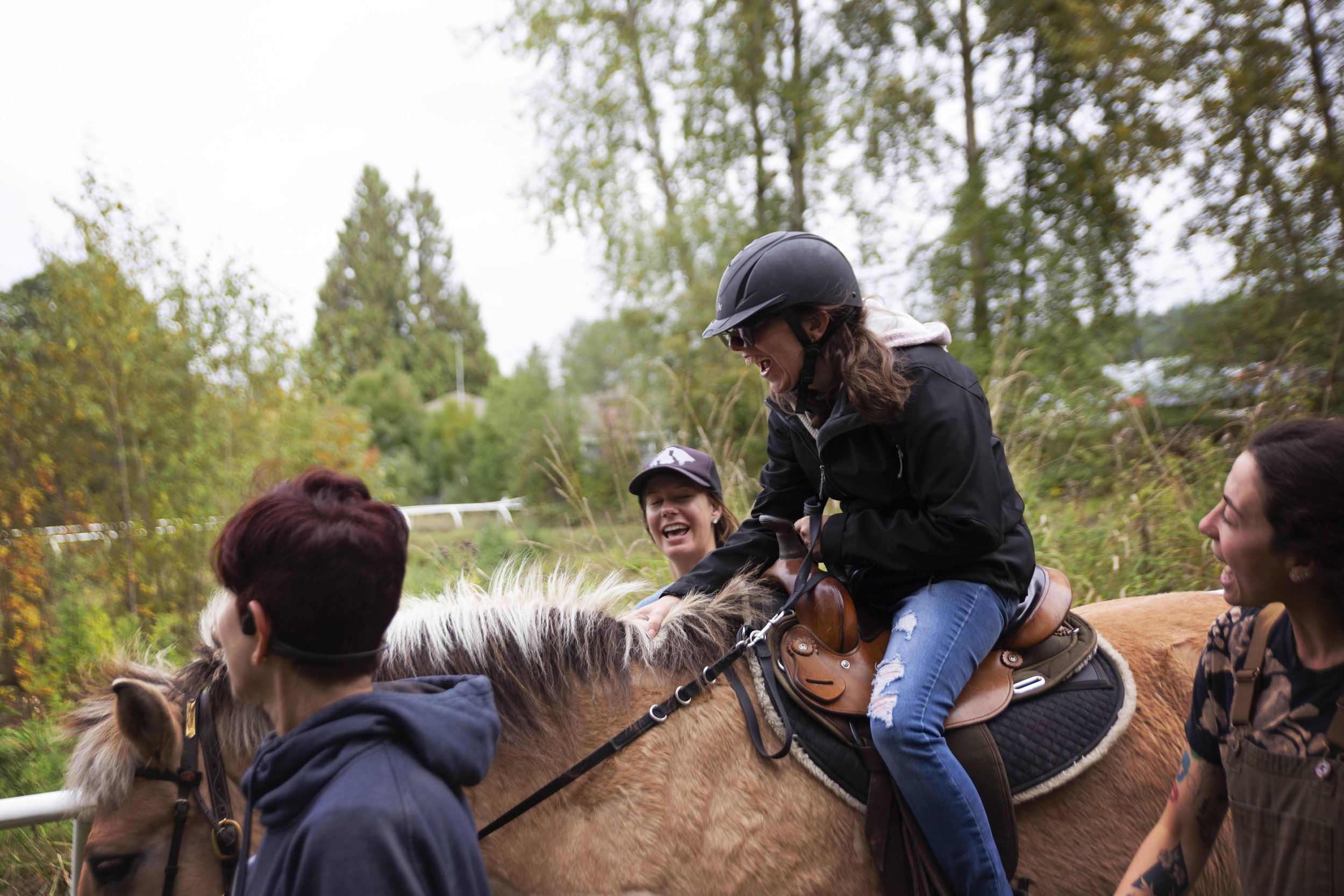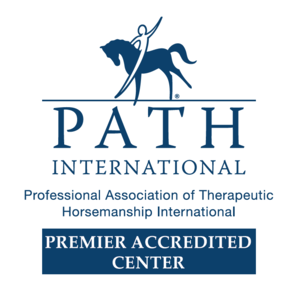Since 1976, we have led the effort to help those with disabilities to lead more enriched lives through adaptive horseback riding and hippotherapy.
Our Mission
Little Bit Therapeutic Riding Center is a community where horses transform the bodies, minds, and spirits of people with disabilities.
LAND ACKNOWEDGMENT
We acknowledge that the Southern Salish Sea region, including Redmond, WA, lies on the ancestral land of the Coast Salish peoples: the Duwamish, Muckleshoot, Puyallup, Skykomish, Snoqualmie, Snohomish, Suquamish, and Tulalip tribes and the other tribes of the Puget Sound Salish people. We honor the land and tribes with gratitude.
Commitment to Diversity
Little Bit Therapeutic Riding Center is committed to creating a diverse, equitable, and inclusive environment for all participants, staff, volunteers, and stakeholders. We strive to ensure that everyone is respected and valued regardless of their race, gender, age, sexual orientation, religious beliefs, abilities, disabilities, socio-economic status, education, nationality, marital status, or any other factor. We actively promote a culture of equity and justice in our work, and we strive to create an environment where everyone can thrive.
Our Values
Engagement
Participants, donors, volunteers, and staff are inspired to engage driven by our results-driven decisions and outcomes. We attract people with the right skillsets and passion for Little Bit’s mission. We inspire increased financial support and increase the number and quality of contributors. Volunteers deepen their engagement by their experiences and relationships.
Leadership
We attract and retain the best staff for the organization and the goals and needs ahead. We are recognized as cutting-edge, serving as a benchmark for other organizations in the industry. We lead with transparency. We expand our services to serve more stakeholders. Our decisions are based on outcomes, data, and measurable impact.
Potential
We see potential in all our stakeholders. We are committed to the continued professional development of staff members. We engage our volunteers in ways that match our needs with their talents and desires to participate. We fulfill the potential of Dunmire Stables. We recognize and develop the potential of each horse.
Dignity and Respect
We treat all our participants with dignity and respect. We acknowledge that Little Bit’s approach requires respectful treatment of our horses. We cultivate the participants’ families and the unique sense of community they find only at Little Bit. We are respected by the greater Redmond community for our dignified and respectful participation in local goals. We respect our staff and volunteers for their services, commitment, and talents.
Service
We provide individual experiences that exceed expectations of participants, staff, board, volunteers, and the broader community. We demonstrate our impact through measurable results. We believe happy healthy horses are at the core of our success.
Communities
We create meaningful connections and engagement for participants, families, volunteers, donors, and staff. We inspire ambassadors for Little Bit through our demonstrated impact and meaningful engagement of all who come to know us. We honor and foster the family community that helps to sustain our families. We are recognized for our excellence: locally, nationally, and internationally.
SUSTAINABILITY
Water
Little Bit provides on-site stormwater management to reduce the impact of our horse herd on the environment since Little Bit’s operations are near Bear Creek, an important salmon stream. There are four detention ponds that help filter water that flows off the property. In addition, between Little Bit’s operations and Bear Creek is the largest rain garden in western Washington. It is managed in cooperation with King County to identify and remove invasive plant species.
Energy
Little Bit is committed to reducing its energy use and has 16 solar panels on its Alvord Barn roof that helps defray the cost of the electricity used in our barn by 19%. Appliances on our site are certified by Energy Star. Lights in our office building are regulated by motion control to reduce energy consumption when rooms are not in use.
Composting
Little Bit has a commercial compost machine that it operates to compost horse manure from our barn and wood shavings that are used as bedding for the horses in the barn. The compost that results is used on site and also donated to community gardeners.
Agriculture
Little Bit does not use any herbicides or pesticides on its 14-acre property. We also use biological fly control as a method for reducing flies on the property.
A history of transforming lives
Little Bit was founded in June 1976 by a woman named Margaret Dunlap. Margaret had Multiple Sclerosis and found that being on the back of a horse slowed the advance of her disease. From our humble beginnings of one horse and five riders, we have grown to be one of the largest nationally accredited, industry-leading PATH (Professional Association of Therapeutic Horsemanship) International centers and one of the largest full-time therapeutic horsemanship programs in the United States. We offer Adaptive Riding and Hippotherapy, and serve over 500 clients annually with 31 horses and the help of more than 1,300 volunteers.
MAKING STRIDES THROUGH THERAPEUTIC HORSEMANSHIP
Our flagship programs—Adaptive Riding and Hippotherapy—both utilize the unique qualities of the horse to effect positive change in the lives of children and adults with disabilities.
Adaptive Riding and Hippotherapy provide life-changing physical benefits including strengthening muscles, preventing bone weakness and joint dislocation, improving balance, and enhancing hand/eye coordination. These benefits improve a rider’s overall health, which, in turn, can increase life expectancy.
They also ripple into other aspects of daily living: promoting confidence and independence, improving communication skills and peer interaction, enhancing concentration and memory, stimulating problem-solving, and providing achievable goals.
EFP is defined as an interactive process to address psychotherapy goals set forth by the mental health professional and the client. It uses the horse as a large “biofeedback machine” to help understand clients’ moods and changes within those moods.
“Horses change lives. They give our young people confidence and self-esteem. They provide peace and tranquility to troubled souls, they give us hope.”
















